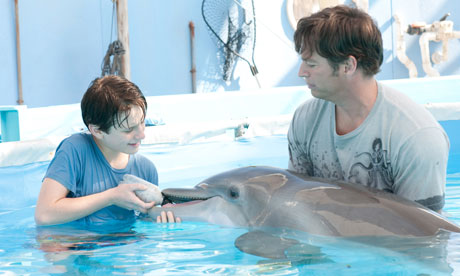
I've lost track how many times my disabled daughter has been offered a swim with a dolphin. While disabled people struggle to get a hoist or a few hours' home help, numerous charities will fly them to Florida to experience the miraculous feeling of frolicking in the water with a friend of Flipper. According to organisations that sell such snake oil, "dolphin therapy" alleviates a wide range of disabilities, from increasing the attention span of a child with attention deficit disorder to curing paralysis. Dolphin Tale is the latest vehicle to peddle this propaganda. This family film is about the remarkable, restorative powers a dolphin called Winter brings to troubled and disabled youngsters.
Two great myths buoy up this linking of a marine mammal with a person with an impairment. There's the myth that dolphins share human characteristics; in the film, the dolphin Winter conducts lively conversations with people in squeak language. And there's the myth that all disabled people need to be whole again is a good dose of inspiration – even from an animal.
There's an international industry that works on the assumption that dolphins are less than a ripple away from us. Arts organisation Dolphin Dance Project makes films of humans and dolphins dancing together in the oceans. It says "we approach the work as the collaboration between equal minds" and states, with no sense of irony, "we would like to imagine everyone who watches our dance to recognise that dolphins are people too".
Are dolphins really humans with slippery skins? Scientific concerns argue the opposite. The Whale and Dolphin Conservation Society (WDCS) says it's unnatural for dolphins to loiter around harbours, banter with bathers and strike up friendships with fishermen. Rather than revealing that dolphins long to communicate with us, this behaviour is aberrant. "Social misfit" would be an appropriate description for an animal apparently preferring the company of a different species. Instead of jumping in, we should back off, says WDCS, and let dolphins hang out with other dolphins.
In the film, Winter is depicted as displaying fond feelings towards her human carers "Winter and I are family," says the boy hero. Dolphin Tale claims to be "inspired by a true amazing story", Winter is "played by herself", and documentary footage is included at the end to prove it. But although we like being with dolphins, the feeling isn't always mutual. Every year, dozens of injuries are inflicted by irate dolphins on people who have "enjoyed a dolphin encounter". Nor are dolphins particularly loving and sensitive. Male bottlenose dolphins have been known to commit infanticide, coerce females to mate and kill harbour porpoises without provocation. It is dangerous to swim with them and not good for the dolphin either, says the WDCS.
Winter is a rescued female dolphin – her tail was torn in a crab trap and she can no longer swim. In the film, a young girl comes to visit her at the marine centre. At first we just see the girl's smiling face. Then the camera pans down, and we realise she's in a wheelchair. "Mommy, she's just like me!" she says, pointing at Winter.
No she's not just like her. She's not like her at all. Winter may have been part of a shoal, but she's never been to school, or to a birthday party, or on a sleepover at a friend's. But the young girl is reduced to nothing but her disability. The only way in which dolphin and girl are remotely – and only remotely – alike is that they both have a disability. It reminds me of a young woman I met who had no arms. She complained that she was constantly being paired off with a young man in her neighbourhood who had Down's syndrome "because you are so alike".
The film follows Winter's struggle to "overcome" her disability by having a prosthetic tail fitted, learning to swim all over again. The film's publicity claims Winter's story "serves as a symbol of courage, perseverance and hope to millions of people". The message to my disabled daughter is clear. If a dolphin can do it, so can you. But she can't, and it's an insult to think that diving in with a marine mammal will make a difference.
There's nothing wrong with a paddle; it might even make you feel a bit better. But the claim that swimming with a dolphin has restorative powers is a scam that ought to be sunk.

